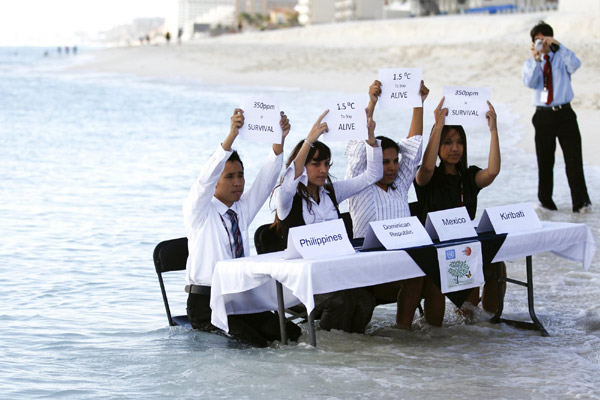Global General
2010 ties for warmest year, US blames emissions
(Agencies)
Updated: 2011-01-13 09:23
 |
Large Medium Small |
WASHINGTON -- Last year tied for the warmest since data started in 1880, capping a decade of record high temperatures that shows mankind's greenhouse gas emissions are heating the planet, two US agencies said.
Global surface temperatures in 2010 were 1.12 degrees Fahrenheit (0.62 Celsius) above the 20th century average, tying the record set in 2005, the National Climatic Data Center at the National Oceanic and Atmospheric Administration said on Wednesday.
 Activists from the 350.org environmental protection NGO sit on a table partially submerged in water as they pretend to represent countries taking part in the UN. [Photo/File photo]? |
"These results show that the climate is continuing to show the influence of greenhouse gases. It's showing evidence of warming," David Easterling, the chief of the scientific services division at the NCDC, told reporters in a teleconference.
It's not possible to directly link global warming as the cause of one weather event. But the trend of rising temperatures since 2000 increases the possibility of extreme weather events such as heat waves, droughts and floods, Easterling said. Every year since 2000 has ranked as one of the 15 warmest years on record, he said.
Last year was also the wettest on record and a warmer atmosphere holds more water, which in general can result in more floods, he said.
FUTURE
The report did not predict weather in the future. But the UN climate science panel says weather is likely to be more extreme this century because of a build up of gases released by burning fossil fuels and forest destruction.
James Hansen, the director of NASA's Goddard Institute for Space Studies, said "if the warming trend continues, as is expected, if greenhouse gases continue to increase, the 2010 record will not stand for long." His office also released a report on Wednesday that said 2010 was tied for the warmest year on record with 2005.
Jay Gulledge, the senior scientist at the Pew Center on Global Climate Change, said farmers and others can adjust to expected warmer temperatures, but preparing for extreme weather is harder. "We've got really immense potential right now to have even bigger impacts from the direct effects of extreme events," he said.
As the weather warmed, the world did not do enough to prevent future climate change, scientists said.
At UN climate talks in Cancun late last year nearly 200 countries agreed to set a target of limiting a rise in average world temperatures to below 2 degrees C (3.6 F) over pre-industrial times.
But promised emissions curbs by big polluters are not enough to achieve that goal and tougher actions are needed, climate scientists said.
NOAA's and NASA's reports were the first of four major ones on global 2010 temperatures. The UK Met Office's Hadley Centre and the UN's World Meteorological Organization are expected to issue reports later this month.
PARADOX
Frigid winters in parts of Europe and the United States in 2010 may be a paradoxical side effect of climate change, some scientists said. Rising temperatures mean a shrinking of sea ice in the Arctic, heating the region and pushing cold air southwards during the winter, according to a study last month in the Journal of Geophysical Research.
Warming of the air over the Barents and Kara seas, for instance, seems to bring cold winter winds to Europe.
"This is not what one would expect," said Vladimir Petoukhov, lead author of the study and climate scientist at Germany's Potsdam Institute for Climate Impact Research. "Whoever thinks that the shrinking of some far away sea-ice won't bother him could be wrong."
The release of the NOAA report itself was delayed one day by an unusually hard snowstorm in North Carolina.
"These anomalies could triple the probability of cold winter extremes in Europe and northern Asia," he said. "Recent severe winters like last year's ... do not conflict with the global warming picture, but rather supplement it."



